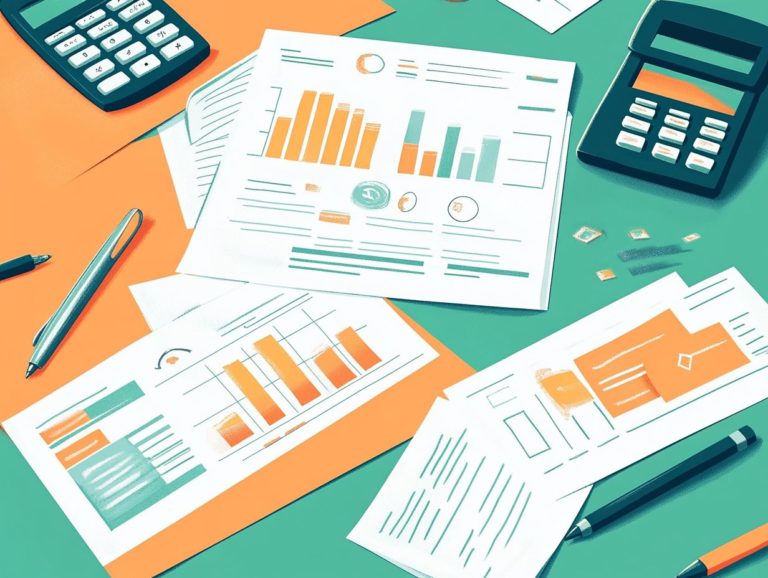What is the Freelancer’s Guide to Managing Debt?
This guide for freelancers explores the common types of debt you may encounter and how these debts can impact your finances.
It provides practical steps to manage and avoid debt, including creating budgets and selecting repayment strategies. The guide will also help you identify when to seek professional assistance.
Contents
- Key Takeaways:
- Understanding Debt for Freelancers
- Managing Debt as a Freelancer
- Strategies for Paying off Debt
- Preventing Debt as a Freelancer
- Seeking Professional Help with Debt
- Frequently Asked Questions
- What is the Freelancer’s Guide to Managing Debt?
- Why is it important for freelancers to manage their debt?
- What are some common types of debt that freelancers face?
- How can freelancers create a budget to manage their debt?
- Can freelancers negotiate with creditors to lower their debt?
- What are some strategies for avoiding debt as a freelancer?
Key Takeaways:
- Understand the types of debt and their impact on freelancers.
- Create a budget and payment plan to manage debt effectively.
- Consider strategies like the debt snowball to pay off debt.
Understanding Debt for Freelancers
Grasping the ins and outs of debt is vital for freelancers like you! The inconsistency of income compared to regular expenses complicates effective debt management.
In a landscape where income fluctuates, implementing sound debt management strategies is essential. Budgeting apps can assist you in tracking expenses while establishing consistent spending habits is vital for managing cash flow and repaying debt.
Awareness of your credit score and its nuances is a challenge, particularly given your unique financial circumstances. A credit score is a number that reflects your creditworthiness.
Types of Debt and Their Impact
You often encounter various types of debt, including credit card debt, student loans, and business loans. Understanding these debts is essential to protect your finances.
Credit card debt is particularly common, as many independent workers face inconsistent income and unexpected expenses. This can lead to high-interest repayments that are challenging to manage.
Student loans help cover education costs, which can be vital for enhancing skills or obtaining qualifications. However, differing interest rates associated with federal subsidized, unsubsidized, and private loans can create confusion in financial planning.
Business loans enable you to grow your venture but can pose challenges if repayments are due before receiving payment from clients. Delayed payments can lead to temporary liquidity crises.
These debts can create unreliable cash flow and contribute to financial instability. Debt consolidation loans may help by allowing you to combine multiple debts into a single payment, reducing the number of monthly payments. This enables you to focus more on your work and potentially lower your overall interest rates.
Managing Debt as a Freelancer
Managing debt demands a strategic approach that includes effective budgeting, cash flow management, and careful financial planning.
Due to unpredictable income fluctuations, utilize budgeting apps and expense tracking tools to gain clarity on your payment terms. This proactive approach enables you to tackle financial challenges more effectively.
Start today by creating your budget and taking control of your financial future!
Creating a Budget and Payment Plan
Freelancers need effective financial management. Budgeting and payment plans help them manage fixed and variable expenses while maintaining a healthy cash flow.
Budgeting apps provide a clearer overview of income management and expense tracking.
Most freelancers encounter fixed expenses, such as rent and utilities. They also have variable expenses, including project-specific tools, travel, and client entertainment. Maintaining a comprehensive list of these expenses allows freelancers to better understand their overall financial situation.
Utilizing the zero-based budgeting method means every dollar is assigned a specific purpose, ensuring nothing is wasted. Alternatively, the 50/30/20 rule is a straightforward approach prioritizing essential needs while emphasizing the importance of savings.
Tools such as QuickBooks and Mint assist in expense tracking and income forecasting, enabling freelancers to make informed financial decisions and avoid common cash flow pitfalls.
Thoughtful budgeting and planning reduce stress. They also serve as a foundation for sustainable growth for freelancers.
Dealing with Variable Income
The biggest challenge freelancers face is variable income, necessitating careful financial planning and effective budgeting techniques. Understanding income variability enables freelancers to adapt their cash flow management and avoid financial strain.
To navigate these unpredictable fluctuations, freelancers should prioritize saving a portion of their income for months when clients are late in payment or overall income is low. Establishing an emergency fund for three to six months of living expenses is crucial. It acts as a safety net during times of financial uncertainty!
Regularly tracking income and expenses helps identify trends. This allows freelancers to make proactive adjustments to their spending habits.
By implementing these strategies, freelancers can build a more solid financial foundation, helping them remain stable during financial hardship.
Strategies for Paying off Debt
Effective debt repayment strategies are essential for freelancers. Two popular methods for reducing debt are the Snowball strategy and the Avalanche strategy. Each approach allows individuals to choose the method that best suits their circumstances.
Debt Snowball vs. Debt Avalanche Method
The Debt Snowball and Debt Avalanche methods are both effective guides for freelancers seeking to reduce their debt. The Snowball method focuses on paying off the smallest debts first. In contrast, the Avalanche method prioritizes high-interest debts.
Each approach significantly impacts a freelancer’s financial health, depending on individual circumstances. For those who thrive on motivation and quick wins, the Snowball method may be appealing, providing psychological boosts from rapidly eliminating smaller debts.
On the other hand, the Avalanche method is often more cost-effective over time, reducing the total interest paid. This is an important consideration for anyone managing the irregular income streams typical in freelance work.
Ultimately, understanding these methods underscores the importance of financial education for freelancers, enabling them to make informed decisions about their unique debt situations.
Preventing Debt as a Freelancer
Preventing debt is a proactive strategy that freelancers can employ to maintain financial stability and safeguard their freelance lifestyle.
Create a solid financial plan with an emergency fund and smart budgeting strategies. This proactive approach keeps financial difficulties at bay!
Start budgeting today! Take control of your finances and secure your freelance future.
Building an Emergency Fund
An emergency fund is a financial safety net for freelancers. It provides security during challenging financial periods.
Having an emergency savings account can help reduce the effects of financial instability. This promotes a more predictable freelance lifestyle.
This fund is particularly important for freelancers, as they do not receive a regular paycheck like employees. This situation results in unreliable income.
Experts recommend saving three to six months’ worth of living expenses as a safety net to cover costs in case of a medical emergency or sudden job loss.
To build an emergency fund, individuals can save a percentage of each paycheck or automate transfers to a savings account that is less accessible. This helps resist the temptation to dip into the funds.
Regularly revising and adjusting your savings target is crucial as your financial situation changes.
Setting Realistic Rates and Boundaries
What are realistic rates and boundaries for freelancers? Setting realistic rates and boundaries is crucial for financial stability and maintaining healthy working relationships with clients.
Establishing clear terms and conditions regarding payment in contracts helps freelancers secure their income. This minimizes payment-related stress.
When determining rates and boundaries, freelancers should consider factors such as skill level, market competition, and project complexity.
It’s also important to anticipate client needs while ensuring that pricing reflects the true value of the services offered.
Communicating boundaries entails expressing your availability and preferred working hours. This prevents misunderstandings and fosters transparency.
Effective financial planning enables freelancers to forecast income and set aside funds for periods of inconsistent cash flow. By mastering these elements, freelancers can navigate the challenges of client relationships successfully.
Seeking Professional Help with Debt
Professional debt assistance for freelancers, particularly in the form of debt consolidation (combining multiple debts into one payment) and negotiation services, can be invaluable for those struggling to manage their debt.
It is essential to understand various debt relief options, including bankruptcy, to make informed financial decisions.
When to Consider Debt Consolidation or Bankruptcy
Deciding whether to pursue debt consolidation or bankruptcy is a critical choice for freelancers facing significant financial challenges. Understanding the implications and benefits of both options helps freelancers manage their debts effectively.
Watch for signs of financial hardship before it’s too late! Increasing late payments, rising interest charges, or the inability to consistently pay bills can trap you in a cycle.
Many freelancers may find themselves relying on credit cards for everyday expenses, leading to a debt cycle that feels unbreakable.
In these circumstances, financial literacy becomes crucial. It helps discern the difference between consolidating debts into one manageable payment and declaring bankruptcy as a fresh start.
By making these choices wisely, freelancers can regain control of their finances.
Frequently Asked Questions
What is the Freelancer’s Guide to Managing Debt?
Discover the Freelancer’s Guide to Managing Debt, your go-to resource for financial empowerment! It provides practical tips, strategies, and advice for managing debt and achieving financial stability.
Why is it important for freelancers to manage their debt?
As a freelancer, your income may vary from month to month. It’s crucial to have a solid plan for managing debt to avoid financial stress, missed payments, and damage to your credit score.
What are some common types of debt that freelancers face?
Freelancers can face various debts like credit card debt, student loans, medical bills, and personal loans. Addressing each type of debt is vital for financial health.
How can freelancers create a budget to manage their debt?
Creating a budget is essential for managing debt. Start by looking at how much you earn and spend, then find ways to cut back and put more money toward paying off debt.
There are many online tools and apps to help you build and stick to a budget.
Can freelancers negotiate with creditors to lower their debt?
Yes, freelancers can negotiate with creditors to reduce their debt. You might set up a payment plan or negotiate for a lower interest rate.
Sometimes, you can settle for a lump-sum payment. Just make sure you know your financial situation before negotiating.
What are some strategies for avoiding debt as a freelancer?
To avoid debt, maintain a steady income and budget carefully. Setting up an emergency fund for unexpected expenses is also a smart move.
Diversifying your client base can help reduce the risk of losing a main source of income. If needed, seek professional financial advice.










